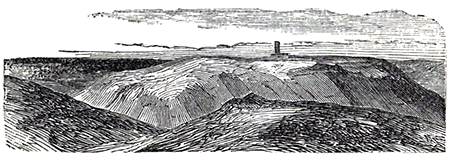
BAÍLÉ AN SCÁIL —
THE VISION OF THE HERO.
One day, Conn went up to the royal hillfort of Tara at sunrise with his three druids
and his three poets. He did this each day, to view the skies, so that the sidhe
should not be in Erinn without his knowledge. There, he happened to step on a stone
and stood on it. The stone underfoot screamed so loudly that it could be heard over all
of Tara and Bregh.1 Then Conn asked his druids why the stone screamed, where
it came from, where it should rest, and how it came to be at Tara.
The druid said he would not tell him until fifty-three days had passed. When the time
had passed, Conn asked the druid again. The druid answered: "The stone is named
Fál. It was brought from the Island of Foal and set up at Tara.
It will rest in the area of Tailltin2 forever; and that land shall
be the fairgrounds as long as there is a king in Tara; and, if a king does not witness
the last day of the fair, the year coming shall be hard. Fal has screamed
under your feet today," said the druid. He then pronounced this prophesy: "The number of
times the stone screamed is the number of the kings of your line who shall follow.
I am not the one who shall name them."
Suddenly, a great mist enveloped them, so they could not see their way. They heard
the noise of a horseman approaching. "It would be a great misfortune," said Conn, "if
we should be carried away to an unknown country." The horseman threw a spear at the
group three times, each throw faster than the one before. "To shoot at Conn in Tara,"
said the druid, "is, truly, to wound a king." At that, the horseman stopped throwing,
approached them, bid Conn welcome, and invited them to his house. They followed him
to a beautiful plain where they saw a regal hillfort and a golden tree, which grew
by its entrance. In it, they saw a magnificent house, its roof beamed with precious
metal. Entering the house, they saw a young woman with a golden crown on her head;
a silver vat, hooped with gold and full of red ale was next to her; on the edge of
the vat was a golden serving dish and at its mouth a golden cup. The hero himself
sat before them on his throne. There had never been in Tara a man of his size, nor
attractiveness, such was the beauty of his body and the wondrousness of his face.
He spoke to them, saying: "I am not a hero, indeed, and I shall reveal to you a part
of my mystery and of my fame: I have come to you from beyond death, for I am of the
race of Adam; my name is Lug, son of Edlenn, son of Tighernmas. The reason I have
come is to reveal to you the length of your rule and of every sovereign who shall
rule in Tara." And the maiden before them was the sovereignty of Erin forever.3
The maiden gave Conn two items: the rib of an ox and the rib of a hog. The ox-rib
was twenty-four feet long, eight feet between the arch and the ground. The maiden
then served them the red ale, asking: "Who shall get this bowl?" The hero answered,
"Give it to Conn of the Hundred Battles; that is what he will be called when he
wins his hundredth battle. He will rule for fifty years and fight the battle of
Bregh, the battle of Eli, the battle of Aiché, the battle of Macha, the
battle of Cenn-tiré, seven battles at Mach-Liné, the battle of
Cuailgne, sevent battles in Cláiriné, and so on.
"In his combat with Tipraité,
Though unequal in strength, their advance;
It is he that shall be wounded while cleaving
The hosts that shall accompany him.
Woeful for Conn of the hundred battles,
After having paved Drech-Mhagh,
He is killed, after having gone round all the bays,
On Tuesday in Tuath Eemruis."4
|
"Who shall get this bowl?" asked the maiden. "Give it to Art, son of Conn; the man
of three shouts.
"He shall fight the battle of Fidh-Ros,
The morning of Mucruimhé,
In which shall fall great warriors,
It will be woeful to Art the son of Conn,
With the sons of Oilill Oluim.
"Upon Thursday he fights the battle
In which he falls by the sons of Lughaidh.
Thirty years only (shall he reign)
At the time that he shall be slain."
|
After Conn and his men departed, they could see no sign of the hillfort
nor the house. The vat, the golden cup, and the bowl were left with Conn.
1. Bregia, roughly co-extensive with Co. Meath and north Co. Dublin.
2. Teltown, Co. Meath, where an annual fair took place for the feast of Lughnasa.
3. That is, this princess of the Tuatha Dé Danann belonged forever
to the one who was to be the sovereign king. This conferred not only "earthly
sovereignty but also immortality.... [Conn] returned to her [in the Otherworld]
after his earthly reign was over." R. S. Loomis, Celtic Myth and Arthurian Romance,
(1997 repr.), 222.
4. The verse translations are by Eugene O'Curry, Lectures on the Manuscript
Materials of Ancient Irish History, (1878 repr.), 621-2.
Citation:
Jokinen, Anniina. "The Vision of the Hero." Luminarium.
13 Apr 2018. [Date you accessed the page].
https://www.luminarium.org/mythology/ireland/100connhero.htm
|

